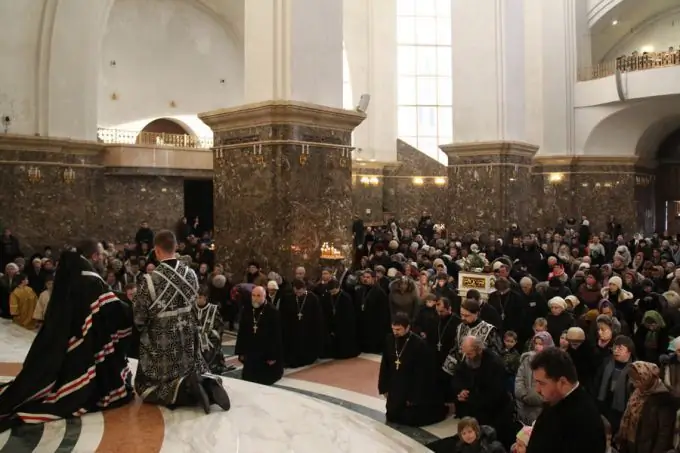- Author Antonio Harrison harrison@cultureoeuvre.com.
- Public 2023-12-16 07:44.
- Last modified 2025-01-22 21:44.
The last Sunday before the beginning of Holy Great Lent is called forgiven. This special day for Orthodox people in 2016 falls on March 13th.

Great Lent is a special time for repentance and spiritual improvement of a person. The last calendar day before saving abstinence is called Forgiveness Sunday.
On this day, the Orthodox Christian tries to cleanse his conscience of all anger, from the bottom of his heart to forgive his neighbor for offense, no matter how strong the grief was. The Lord Jesus Christ Himself commanded a person to forgive his neighbors, to have mercy, because in this case, the person himself will be granted forgiveness from God.
The meaning and meaning of Forgiveness Sunday is very important for the spiritual life of an Orthodox person. On Forgiveness Sunday, every Orthodox Christian not only leaves offense to his neighbor, but also asks for forgiveness himself.
In Orthodox churches on the evening of Forgiveness Sunday, a special service is served, ending with the rite of forgiveness, during which all those present in the church ask each other for forgiveness, clearing their consciences before their neighbors. This act of reconciliation is necessary in order to worthily enter into Great Lent and ascetic in the spiritual virtues of prayer and fasting.
An Orthodox person needs to understand that it is very important not just to wait for the person who has sinned to ask for forgiveness. It is worth, according to your mercy, the first to take the step of reconciliation, asking for forgiveness, even in the case when the blame lies with the neighbor.
It often happens that by his behavior a person leads him into temptation, the temptation of his neighbor. In mundane language, this behavior can be called a provocation, because of which the people around you become angry and can offend in a rude form. Asking for forgiveness from neighbors can also be viewed as an apology for the temptations and temptations in relation to another person that took place in our lives.
Holy fathers about forgiveness
All the holy fathers of the Church wrote especially about love, mercy and the ability to forgive one's neighbor. Many of them categorically said that without forgiveness and abandonment of grievances, prayers and fasting itself are useless.

The Lord's Prayer "Our Father", given to man by the Savior, contains in itself asking God for forgiveness, just as a person himself forgives "debts" (offenses, sins). If a person does not forgive his neighbor, then he is not worthy of personal forgiveness from God, because the Orthodox Church proclaims that there is not a single person who has not sinned before his Creator.

Every Christian should understand that God, in His mercy, forgives every repentant person. The repentant sinner can hope for the mercy of God. The Christian should strive to be at least a little worthy of such divine love. This dignity is also manifested in such an aspect as the ability to forgive and ask for forgiveness.


Thus, it turns out that Forgiveness Sunday is very important for the spiritual life of every Christian. One cannot count on the worthy conduct of Great Lent if the conscience is not cleared by leaving grievances to one's neighbors and asking forgiveness from the latter. You cannot begin the feat of prayer and fasting, having hatred and anger against another person in your heart.






